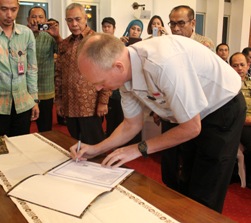Palm oil producers step up fight against forest burning in Indonesia
In Indonesia, clearing land by fire is a major cause of air pollution. Now, Cargill and other palm oil producers are expanding efforts to change things.
October 07, 2014
Indonesia is home to over 250 million people, the world’s fourth-largest population. The country is also known for rampant forest fires that smother neighboring Southeast Asian countries like Singapore and Malaysia in haze every year. In June 2013, the region experienced the worst air pollution crisis in a decade. But if all goes the well, the situation may take a turn for the better.
Cargill Tropical Palm (CTP), one of the few foreign palm oil companies in Indonesia, has taken the lead to fight the haze in the region by supporting government efforts to prevent and control land and plantation fires in South Sumatra, Indonesia. John Hartmann, chief executive officer for CTP was in South Sumatra recently to sign a declaration along with others from the plantation industry.
“We have a responsibility to the local communities around our plantations to educate and raise awareness on best practices on fire prevention and responsible farming,” said Hartmann
Zero-burning
 Marking a commitment to supporting the prevention of land and plantation fires in South Sumatra, John Hartmann, CEO of Cargill Tropical Palm Holdings, signed a declaration along with others from the plantation industry.
At its palm plantation in PT Hindoli in South Sumatra, Cargill conducts regular fire prevention programs for members from the surrounding communities. Fire fighting vehicles and personnel are also on standby at each of our locations.
Marking a commitment to supporting the prevention of land and plantation fires in South Sumatra, John Hartmann, CEO of Cargill Tropical Palm Holdings, signed a declaration along with others from the plantation industry.
At its palm plantation in PT Hindoli in South Sumatra, Cargill conducts regular fire prevention programs for members from the surrounding communities. Fire fighting vehicles and personnel are also on standby at each of our locations.
Cargill maintains a strict zero-burning policy. “Our commitment goes beyond mere words on paper,” added Anthony Yeow, PT Hindoli’s president director. “Burning pollutes the environment, but equally important are the health hazards it brings to our colleagues as well as to the children and families living in our local communities.”
For Sudi Raharjo, senior development manager at PT Hindoli, teamwork is key. “We make a concerted effort to practice what we preach. This can only be achieved through strong, cohesive collaboration across our plantations in South Sumatra.”
“This includes our smallholder farmers who operate over 17,500 hectares of land under our smallholder development scheme,” added Sudi. “They learn sustainable farming methods from our farmer development team.”
Cargill also works with independent oil palm smallholder farmers who do not fall under our smallholder development scheme. In July 2013, Cargill launched its first-ever program in Malaysia to help over 2,500 independent smallholders meet RSPO standards. More recently, PT Hindoli partnered with a 45-strong independent smallholder cooperative in South Sumatra to adopt sustainable palm oil production practices. Watch this video to learn more about how their lives have changed.
Cargill’s palm oil policy
Cargill is firmly committed to sustainable palm oil production and sourcing. Our new palm policy released in July underlines our commitment to building a traceable and transparent palm oil supply chain that will ensure:
- No deforestation of high conservation value (HCV) lands or high carbon stock (HCS) areas
- No development on peat, regardless of depth
- No exploitation of rights of indigenous peoples and local communities
Cargill also recently announced its membership to The Forest Trust (TFT), an international non-governmental organization that helps companies build responsible supply chains.
